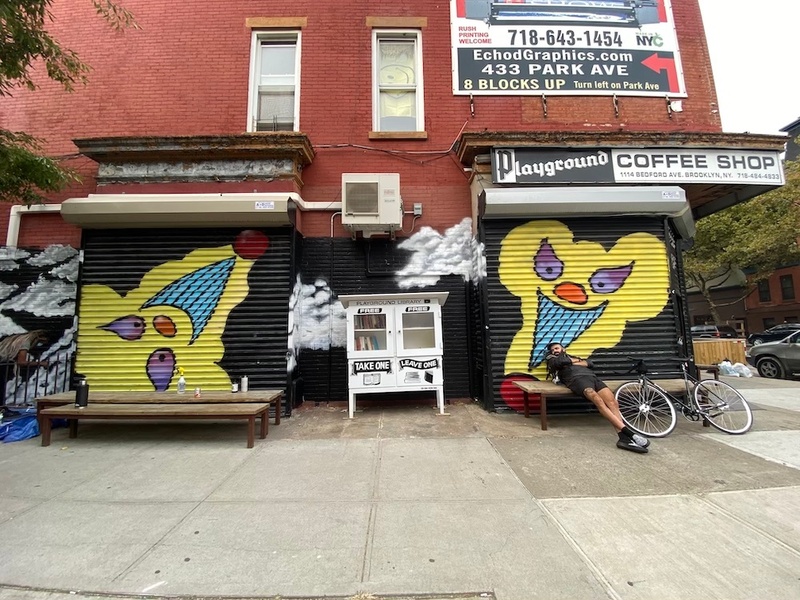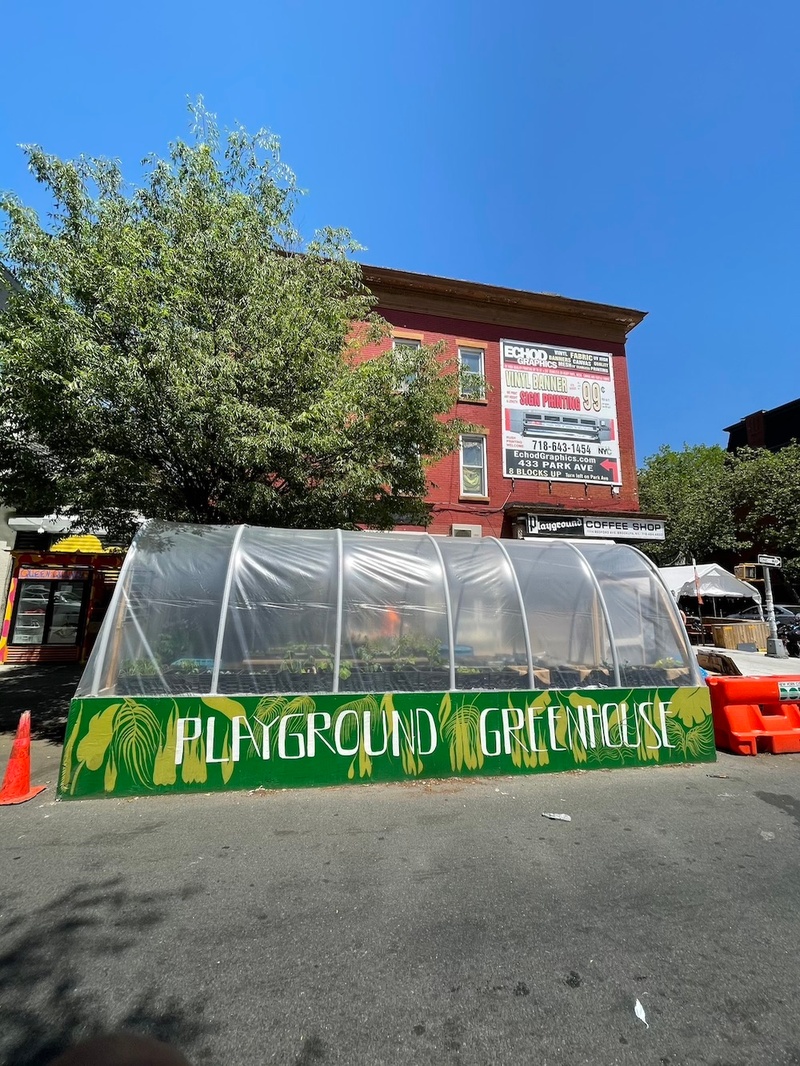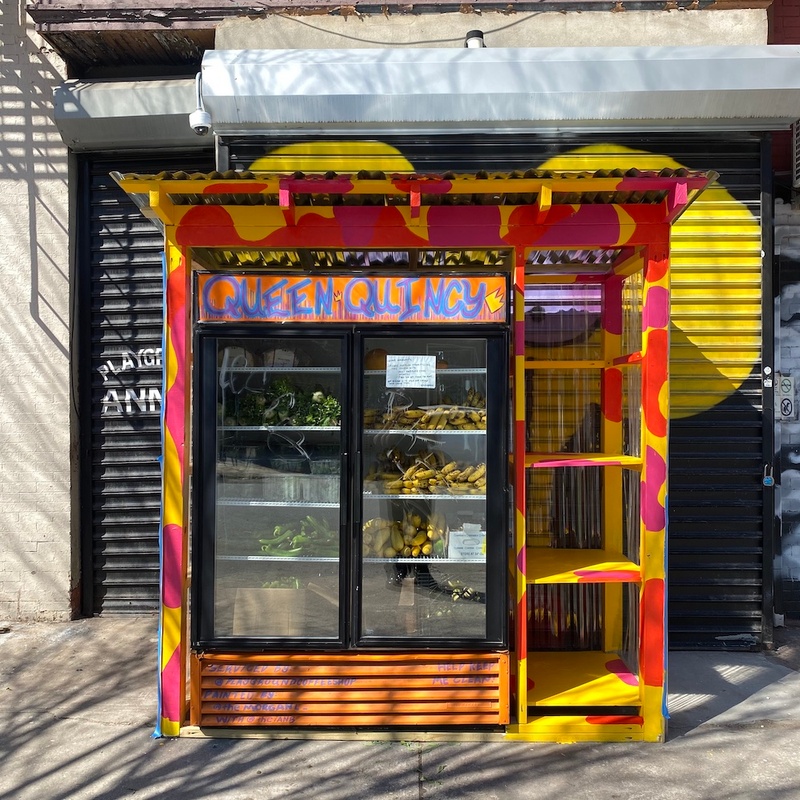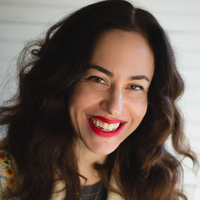On knowing when to slow down
Prelude
Zenat Begum is a native New Yorker, owner of Playground Coffee Shop, founder of Playground Youth, and an alumni of The New School. Zenat intentionally seeks to center BIPOC, marginalized bodies, the arts, and community engagement in order to foster change in a shapeshifting and gentrifying BedStuy.
Conversation
On knowing when to slow down
Playground Coffee Shop owner and community organizer Zenat Begum discusses what she learned from her parents and applied to her business, prioritizing downtime, the value of service work, and including your community in what you do.
As told to Rona Akbari, 2463 words.
Tags: Food, Art, Activism, Business, Money, Success, Collaboration, Identity, Mental health, Multi-tasking.
Before there was [your coffee shop] Playground, there was your parents’ hardware store. I’m curious to know what remnants of the store, maybe spiritually or in the ethos of your own business, remain at the shop? How do you feel it’s metamorphosed?
There’s so much to be taken from my parents’ business, just overall understanding and security, people watching out for each other. My parents moved here with little information about how the world works in a first-world country, so coming here was very much trial and error, and I’m very much a person who will try anything. It’s just so important to me that I’ve even attempted to do something. Something that my parents taught me is—don’t give up.
I’ve been so persistent about Playground since I’ve opened. It’s carrying my family’s legacy, having a business in Bed-Stuy for 20 years, but also having a translate to my business—which has the same aspect of this communal giving and mutual aid and mutual comfort and mutual networks. This is all really important because that’s essentially how immigrants operate when they first get here. Being a person who has so many ties to this immigrant family and this immigrant makeup and this archetype that exists within the American culture, it’s important to acknowledge that those same procedures and methods of getting money and being successful is very much embedded in my practice.
I understand that I have to wake up really early in order to do things. My dad’s very much that person. I get my accounting side from my mother. She helped my dad run his business for 20 years and effectively file taxes and learn tax codes. All that stuff is really important. It’s been important being able to see what my parents were doing and then mirroring it and doing it for myself and projecting those same kinds of mannerisms into my business. I know that the same way that my parents took care of this business is the way that they took care of me.

I only hope to take care of my business the way that I’d hope to take care of my family. And also being able to just understand everybody’s wants and desires, because that’s also something we don’t have and that our parents didn’t have the freedom of was imagining and dreaming of a world that they wanted. So for me, that’s very much what my existence is because my parents did a lot of the work of trying to plan things out and there was never any room for indecision. And now I have all the freedom to just be like, “This is who I am. I exist in the in-between,” or whatever it is. Learning from my parents, I’m able take all their skills and the lessons and apply to my business to make it the best fitting for me.
What are ways that you avoid burnout and take care of yourself?
One thing that I’ve learned is that, especially as a woman of color, and working with so many women, is that we’re not told to recharge and take care of ourselves. I’m not saying in the very surface-level method, with implications of a mask or some tea, I’m talking about real meditating, real grounding work, because how are we supposed to get right, if we’re not able to make sure that we’re all good to go before helping our community? A lot of the times people who are facilitators and organizers and educators have to withstand this burden that there is no time to rest because there’s so much to be done, but it’s only going to go as fast as you want it to. It’s only going to go as slow as you want it to. And it’s only going to go as well as you want to. So I think that if you are going to be honest with yourself, something to do is prioritizing your own personal days.
I give myself two days of the entire week to do nothing. And then on the other days I’m either working or doing projects that involve my attention, but really, it is important to have fun. And I think that in a world where fun is something that’s so limited right now and where travel is limited, I’m trying to take time to actively put myself in groups. Like, book clubs. Also play music with my friends. Every weekend we’ve been partying in my house or my friend’s house. We play and share music. It’s like during summer break in the 2000’s, where I would burn CDs for my friends. There are so many different ways where you can channel your inner child, but it’s really important to just tap in and know when to stop before you have to stop.

Playground has started a number of community projects. Most recently that’s included the greenhouse project. There’s a lot of art behind it—the writing, designs, paintings. It fits into not only the culture of the coffee shop, but also the culture of the community. What inspires your creativity? What does that process look like?
You know what’s crazy, I’ve always wanted these projects to exist, but I’ve never had a space to do it. I opened a bookstore and I was always struggling, because people low-key don’t read, and we know that to be the truth because everybody’s so obsessed with living and the present and going to parties. Culture really just kind of happened at the intersection of galleries and fucking parties. We know that’s what your culture is like here. There’s very cliquey groups.
I think that’s what I’m really confused about is how, then, New York came to be and how, then, New York was the vision of so many people. During the pandemic it got me thinking about all these people creating these anecdotes around leaving New York where it’s like, “Oh, after so many years, I’m leaving.” That’s for people who believe that New York is this place where they just party and just do all that. But what about the people who actually live here? What about the people who don’t have the option of leaving? That’s the way I thought about it. I thought about people who couldn’t ask for help. There are so many educators and caretakers. I’m talking about babysitters, immigrant women who moved to this country to essentially take care of other white people’s kids. What about those people? They lose a job because you’re all of a sudden moving to Long Beach, California, to live in your beach house? I wanted to give something to families who already exist here and families who have no other option.
The greenhouse is an important step because we’re learning how to grow food, and this comes from the community fridges. As soon as you put the community fridges up, our four community fridges, you literally hear the shot heard around the world. I was thinking about how many community fridges this spearheaded. It’s astronomical. That’s why we do it. We do it because it matters and it’s making sense in a lot of communities. And yes, of course, when we’re doing these things, we’re not thinking about immediate success, I’m doing it because I see my family members, my community members, my patrons, my customers looking for something…a hope.

There are families who are vulnerable. My customers can come in here and are able to connect with us through our brick and mortar space. They’re able to get an opportunity to volunteer, to use the fridges, and also just help decorate and keep them really fun.
I also realized that a lot of free programs in this country are very sad. They’re bland. There is no engagement. And I think that’s why we’re finding it really hard for people to even come back and get their fucking second vaccine, because things are just so dreadful. And I want to bring this corner of the world to people and the ways it’s so colorful. That’s how we painted the greenhouse. We painted the fridge. We made a take-one-leave-one library, because books should be available. You should get produce. You should also be able to grow your own food and have education behind it. And for all the times people came up to us and were like, “Hey, you kind of saved my life this year.” That’s why we do it. We do it for the people whose lives have been greatly impacted by these things.
And, of course, a lot of people want to get the news and ultimately the tea about what Playground is. And it’s like, we’re going to keep changing and metamorphosing. We’ve been in this cocoon phase for a few years, and now we’re ascending. We’re spreading our wings. We’re reaching communities we’ve never had. We have widespread impact. We have bandwidth to be able to control these things.
As these demands get more and more heightened, we also have to understand that we have to provide. I feel like Playground’s exemplary of how to build a bridge between community and businesses, because a lot of businesses just come here for exactly that, and there is no hope for people to get involved in communities, and like I said, it’s so cliquey. I think that Playground as a coffee shop is so approachable and because all of our facilities are outside, our fridge is outside, our take-one-leave-one library’s outside, our greenhouse is outside…You don’t have to physically come in here to get involved.
Does it ever get intimidating or scary being like, “Oh, we have really big shoes to fill and people are relying on us. We have to show up.” Or is it just not a question, you just keep plowing through?
It doesn’t make sense to work beyond your limit. In the summer I was going really ham. I was doing so many things. I was filling fridges every day, then I ran out of money. That’s why we started the greenhouse. I was like, “I’ll start to grow food for our community fridges.” Money runs out. Your opportunities will also start to slim down if you don’t know how to approach these things. I went really hard last year and, as a result, my car got stolen, my bag got stolen, and I realized, I have to stop. I have to pause because if not, I’m going to lose my mind. Which is going to be the worst. Because I can’t replace my mind. That’s when I started to realize that taking some time for myself, really implementing self-care days, days where I don’t do anything, is important because I can’t work beyond my means.
I always try to tell myself to slow down, because if things go really fast, things can get really, really blurry. I hope that if I put in the work now that, years later, I’m able to at least provide for my community in a way that’s rewarding for all of us, without me having to work a mile a minute. And we’re learning to work smarter, not harder. I think that’s such a cliché statement, but truly, working smarter, realizing that maybe I don’t have to do everything, I can employ someone to do something. Maybe I can even start spreading and distributing tasks, and just overall talking about your goals and your achievements out loud and wanting to know that this is what you want to hit, therefore let me get these people and do this. It’s just all about strategy.

What’s one thing that you wish more people knew about the kind of work that you do?
The one thing I do wish everybody understood about me is that I’m not going to stop. It’s been a year since the pandemic hit, and I feel like I’m going even harder every day, because the work matters. I didn’t have that much support opening. My parents really didn’t understand what I was doing. I felt crazy, wanting a business that I didn’t really know was going to work out. It’s still very all over the place, but it’s organized chaos. I love to know that there’s a system behind all this, that we’re not just running around aimlessly. But I want people to know that we do a lot, and I do everything.
It’s so interesting. A few years ago, I threw a prom to fundraise for Playground at Sugar Hill, which is a Black-owned business in Bed-Stuy. I had a situation with one of these DJs that was supposed to perform there. There was a discrepancy with the equipment. I remember her looking at my face and being like, “You make coffee and I DJ. There’s a difference between our careers.” And I was like, “Right.” There’s an amount of shame with being a service worker, whether you’re a sex worker or you’re a food service worker, whatever. People really belittle you. Being a service worker has been so eye opening and so amazing, because I can literally do anything. I built these tables that are in the shop with my dad. I built this shop with my dad. I’m talking about from the couch to a bunch of chairs to the floor to the ceilings to the fixtures… This shit is not easy. And I think, as a business owner, I’m able to put on so many hats every day. Literally, I have to have a hat on.
But it’s important to realize that we are also artists in so many ways. It’s not limiting; in fact, it’s even more groundbreaking to have this as a touchstone of reference. This is who I am. This is what I’ve learned. This is where I’ve come from. It’s humbling because I never really thought this would happen for Playground, but I really do believe in this community, and I think that’s why you shouldn’t not believe in me, because look how far I’ve come with this much amount of belief from everyone else. Imagine if this place was fully supported, what we could accomplish then? But that’s another conversation for another time.
- Name
- Zenat Begum
- Vocation
- Entrepreneur and organizer, owner of Playground Coffee Shop
Some Things
Pagination



